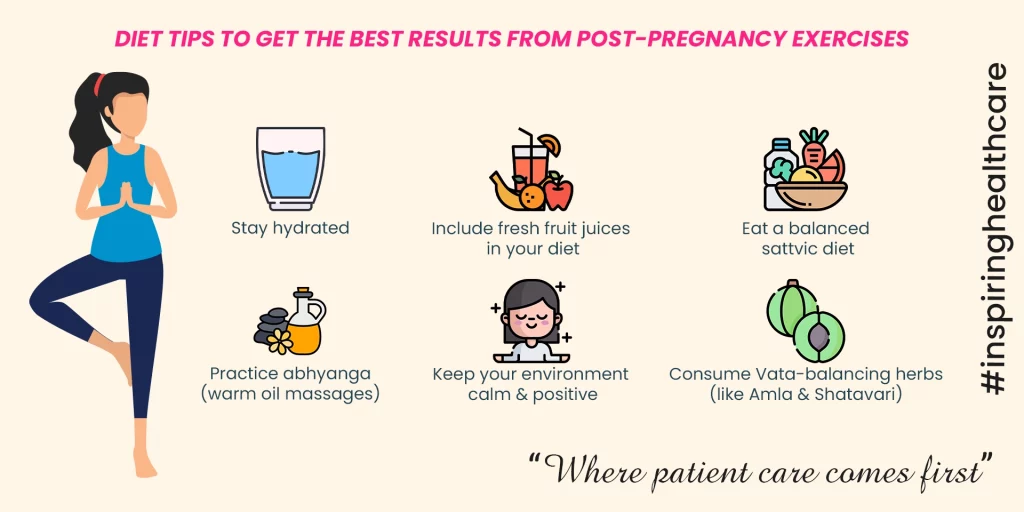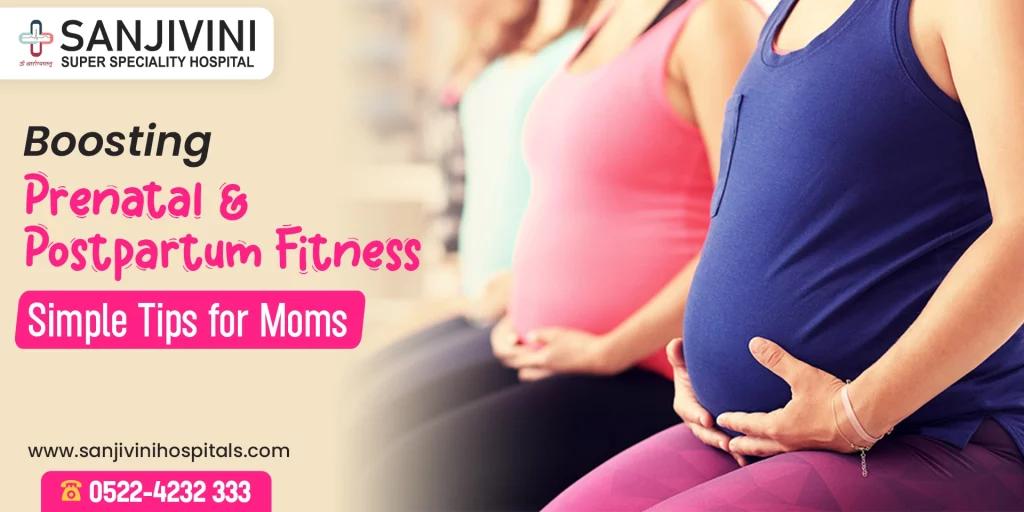Staying fit during pregnancy and after childbirth is crucial. Whether you’re a new mom or just embarking on your pregnancy journey and aiming to integrate exercise into your routine, figuring out how to start can be daunting. Let’s delve into Prenatal & Postpartum Fitness workouts, from kick-starting your fitness journey to ensuring safety along the way.
Book an online appointment with Dr. S Sharma for Pregnancy & Gynecology related issues.
Prenatal Fitness Tips
During pregnancy, it’s vital to focus on your health and well-being with safe and suitable exercise routines. Here are some expert-recommended prenatal fitness tips:
- Consult with your healthcare provider: Before beginning any exercise regimen during pregnancy, seek medical advice to ensure safety and suitability.
- Choose safe exercises: Opt for low-impact activities such as walking, swimming, and prenatal yoga to maintain fitness levels without excessive strain.
- Listen to your body: Pay attention to any discomfort during workouts and adjust the intensity accordingly to prioritize your well-being.
- Include pelvic floor exercises: In 3rd trimester only Incorporating pelvic floor exercises into your routine is essential as they support the birthing process and help prevent postpartum complications.
These tips highlight the importance of staying active during pregnancy while focusing on safety, listening to your body’s signals, and engaging in exercises that support your changing body during this special time.
Also Read: The Importance of Regular Gynecological Check-ups
Exercise During Pregnancy
It’s common for women to start or resume exercise during pregnancy to improve comfort. Those who were active should modify workouts, while inactive ones should begin gently. Prenatal exercise aims to strengthen muscles for labor, improve circulation, relieve backaches, and aid sleep. Listening to your body and being mindful is crucial. Safe exercises include swimming, low-impact aerobics, water aerobics, and walking.
Stop exercising if you experience:
- Chest pain or breathing difficulties
- Dizziness or uterine contractions
- Vaginal fluid leaks
Staying hydrated, and wearing supportive shoes, and comfortable clothing are vital for a healthy workout routine.

Postpartum Fitness Tips
For effective postpartum fitness, follow these expert tips:
- Allow Ample Recovery Time: Prioritize your body’s healing by taking sufficient time before resuming exercise.
- Ease into Exercise: Start with gentle activities like walking. Gradually increase the intensity to prevent strain.
- Focus on Pelvic Floor Health: Make pelvic floor rehabilitation exercises a priority to address postpartum pelvic floor issues and aid overall recovery.
These tips advocate for a gradual and mindful approach to postpartum fitness. They emphasize respecting your body’s healing process, gradually reintroducing exercise, incorporating your baby into workouts, and targeting pelvic floor health for a smoother recovery journey.
Postpartum Exercise: Benefits and Importance
Exercise plays a crucial role in post-pregnancy recovery, offering numerous advantages for both physical and mental well-being. Here’s why incorporating exercise into your postpartum routine is beneficial:
- Prevents Postpartum Depression: Engaging in regular exercise can help ward off feelings of postpartum depression, promoting a more positive mood and emotional balance.
- Strengthens Abdominal Muscles: Targeted exercises can aid in strengthening the abdominal muscles, which often weaken during pregnancy and childbirth, helping to restore core strength and stability.
- Promotes Better Sleep: Physical activity has been shown to improve sleep quality, helping new mothers to rest more soundly amidst the demands of caring for a newborn.
- Relieves Stress: Exercise is a natural stress reliever, releasing endorphins that promote feelings of relaxation and well-being, crucial for managing the inevitable stresses of new motherhood.
- Boosts Energy Levels: Despite the fatigue that often accompanies caring for a newborn, regular exercise can increase energy levels, providing a much-needed vitality boost for new moms.
- Aids in Weight Management: Incorporating exercise into your postpartum routine can assist in shedding pregnancy weight and maintaining a healthy body weight over the long term.
By prioritizing postpartum exercise, you can not only enhance your physical health but also nurture your mental and emotional well-being during this transformative period.
The journey of prenatal and postpartum fitness is a vital aspect of a mother’s well-being during this transformative period. It’s crucial to prioritize health and self-care amidst the demands of pregnancy and caring for a newborn.
As every woman’s experience is unique, listening to one’s body and seeking support when needed are paramount. Whether it’s starting with gentle exercises during pregnancy or gradually reintroducing physical activity postpartum, the focus should always be on nurturing both the body and mind.
Remember, your health matters, and by prioritizing self-care, you’re better equipped to navigate the joys and challenges of motherhood. Stay mindful, stay active, and don’t hesitate to reach out for assistance along the way. Your journey to prenatal and postpartum fitness is yours to embrace and empower.
Must Read : Gynecological Self-Care Tips for Newlywed Women
Want to consult the best gynecologists in Lucknow….Visit Sanjivini Super Speciality Hospital Lucknow or book your consultation here.
FAQs
- What distinguishes prenatal and postnatal exercise?
- Prenatal exercises are those performed during pregnancy, while postnatal exercises are initiated after childbirth.
- What constitutes postpartum fitness?
- Postpartum fitness encompasses exercise routines tailored to help individuals regain an active lifestyle following childbirth.
- How do prenatal and postnatal care differ?
- Prenatal care involves medical attention received during pregnancy, including scans, blood tests, consultations, and examinations.
- Postnatal care extends from childbirth to six weeks after delivery, encompassing medical care for both the mother and baby. This includes general health monitoring and support.

